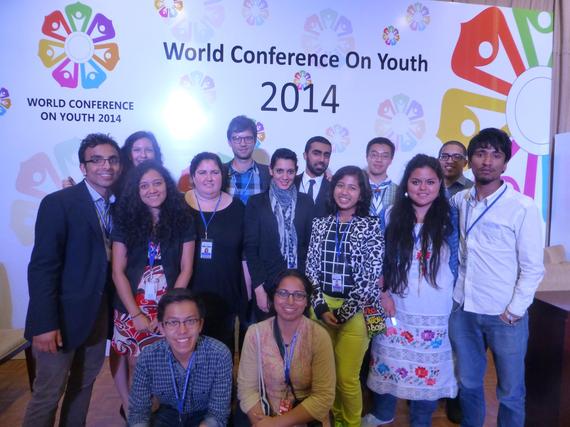
Pictured above are members of the United Nations Major Group for Children and Youth who attended the World Conference on Youth, 2014.
In May, Sri Lanka held the World Conference on Youth 2014, bringing together 1500 youth delegates, government representatives, UN officials, and other relevant stakeholders. With the underlying theme of 'Mainstreaming Youth in the Post-2015 Development Agenda', the conference served as a venue for young people to review the progress of the Millennium Development Goals, which will soon expire in 2015, and contribute to the development of the world's next development agenda. This was the first time that the World Conference on Youth resulted in a joint outcome document. The product of the conference, the Colombo Declaration on Youth, was the result of collaboration between Youth Delegates from 142 countries and Ministers of Youth from 42. This document will submitted to the UN Secretary General and is hoped to influence his final report and recommendation to the UN General Assembly this fall on the Post-2015 Development Agenda.
Having had the pleasure of attending as an International Facilitator, I had the opportunity to help guide the dialogues of the topic on "Environmental Protection, Emergency Preparedness, and Youth Centered Urbanization", which were synthesized and submitted to negotiations. Collectively, in the final draft, the declaration put forward 97 recommendations for the 7 Foundations of:
1. Achieving Good Governance & Accountability
2. Inclusive Youth Participation at All Levels
3. Youth Rights
4. Globalization/ Inclusive Youth-Led Development (MOI)
5. Ending Systemic Inequalities
6. Gender Equality
7. Empowering Marginalized Youth Including Most at Risk Young People
And the 7 Thematic Areas of:
1. Realizing Equal Access to Quality Education
2. Full Employment and Entrepreneurship
3. Poverty Eradication and Food Security
4. Promoting Healthy Lives and Access to Health
5. Environmental Protection, Emergency Preparedness and Youth Centered Urbanization
6. Realizing Peace, Reconciliation and Ending Violence
7. Ensuring Inclusive Recreation, Sports and Cultures
This declaration was not solely a document written by youth, or one by government. If it was simply a youth document, it will be overly ambitious, and if it was a document written by governments, it will be the opposite and lack ambition. This joint document reflects both the dreams of young people for a better world with the realities that cannot be ignored. That said, the WCY opened a window for the world to recognize that intergenerational dialogue and collaboration is possible, and that young people are capable of contributing positively to society around them as active, thoughtful world citizens.
Despite the successes of this conference, it is clear that our work is not finished. There is no guarantee that this document will go anywhere, as declarations are naturally non-binding and need to be ratified in the domestic sphere for direct application. The real work that young people need to do now is to lobby and have their respective governments be aware of the priorities agreed on in Colombo. In midst of the global scheme, we must not forget that real change starts on the ground. We can have global frameworks that bring to light issues that would otherwise have remained in the dark, but it has to eventually trickle down to the local level because that is where citizens have the most power to influence decision-making and hold their governments accountable. That is why the Colombo Declaration is also a call for young people to mobilize on the ground and contribute to their community in any capacity they can.
It is imperative that we recognize the urgent need to react and mitigate our problems before it is too late. For environmental protection alone, out of the 90 key environmental goals agreed by governments in the past 40 years, only 4 have shown "significant progress." The rest are either off-track or heading in the opposite direction. There is an old Inuit saying that offers an accurate characterization of the issue at hand: "We do not inherit the earth from our fathers, we borrow it from our children." Indeed, we must quickly act now to give back to the future generations what ours and previous generations have taken for granted. I am hopeful and optimistic about what is to come. After all, I believe that optimism is what is needed to change the world, and if the youth aren't being optimistic, who will?
